Xbox in your PC: The Universal Windows Platform is premature, but not evil
Epic Games CEO Tim Sweeny recently slammed the Universal Windows Platform (UWP) as a nefarious attempt by Microsoft to ensnare PC game developers in an iOS-like app store hell.
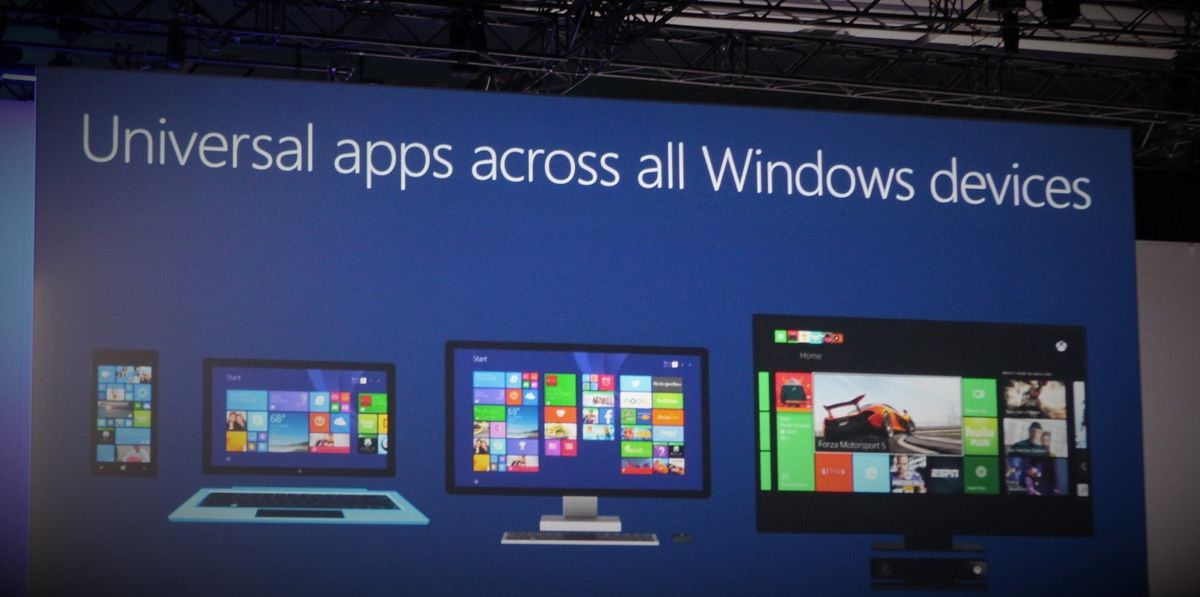
In the article, he explicitly requests that gamers oppose UWP, stating in plain terms:
"Microsoft is moving against the entire PC industry — including consumers (and gamers in particular)."
Tim Sweeney has since backed down on some of his stronger hyperbole, admitting that he had no proof of Microsoft's apparent "evil" intentions. Indeed, Microsoft's own knowledge of UWP is limited, as the sprawling project is barely emerging from infancy. As Windows Central readers will know, UWP's implications for consumers, developers, and Microsoft are vast, far beyond the PC gaming market where Sweeney's personal stake lies. Not only are those implications broad in scope, they're absolutely necessary.
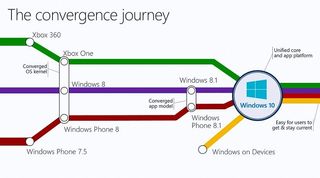
Beyond the promise of Windows 10 Mobile receiving apps on the back of Universal Windows Apps (UWA) developed for PC, forgetting the capabilities for UWAs to conform to almost any device form factor, present and future. From IoT to Windows Holographic, to Xbox One, phones and PC, UWP is a utopic vision of software development unity that just hasn't been attempted on this scale before.
The roots of Sweeney's concerns aren't without cause, especially when gaming is concerned. Speak to the wider community who isn't actively tracking (or interested) where Microsoft has been taking the company recently. You'll discover lingering resentment, bad memories of the maligned Games for Windows Live program, and a bunch of memes depicting how much Internet Explorer sucks — aspects Sweeney was quick to draw on for his Guardian piece (without the memes, sadly).
Despite owning the platform, I'd argue that Microsoft is a total outsider when it comes to PC gaming, and they've earned that position through years of neglect, bad ideas and poor messaging.
Well, times have changed, and it's time to give Microsoft another chance.
Universal What Platform?
The Universal Windows Platform is a method for packaging an application for distribution on Windows 10 devices. With minimal code tweaks, a developer can publish a responsive app to Windows 10 PCs, Windows 10 mobile phones, HoloLens, and eventually the Xbox One — taking advantage of every input you can imagine, whether it's mouse and keyboard, controller, touch, or air touch as seen on HoloLens. Sweeney attests that UWP packages sit in opposition to Win32 executables, a format that encompasses everything from Steam-distributed games to Photoshop to Spotify.
Get the Windows Central Newsletter
All the latest news, reviews, and guides for Windows and Xbox diehards.
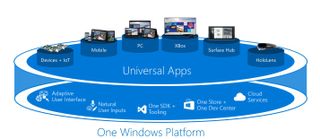
One of Sweeney's key criticisms was that UWAs need to be distributed through Microsoft's Windows 10 app store. On this point, he was off the mark — you can 'sideload' UWA very easily, arguably more quickly than you can obtain Epic Games' own Unreal Tournament reboot, which requires an irritating launcher and an "Epic Games Account." And Twitter user @aL3891 recently demonstrated how a UWP can be packaged into a Win32 .msi installer using features supported by Microsoft.
He also complains that Microsoft (like Steam) takes a cut of a developer's sales for apps sold through this storefront, in addition to the fact UWAs gain access to specific Windows 10 features currently unavailable to typical Win32 installations, including the all-important Xbox Live API.
When it comes to AAA games, which Sweeney's Epic Games are well known for, the Windows 10 Store admittedly provides a sub-optimal experience for finding the titles you want. If you're hunting down Quantum Break in the Windows 10 Store, you might have to wade through an avalanche of terrible mobile titles and other apps you're uninterested in to find it. Right now, the Windows 10 Store isn't designed to distribute and promote big titles like that. As an example, the download bar doesn't display accurate progress information. Fairly basic stuff.
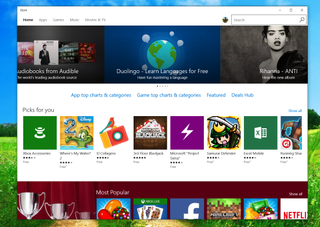
UWP also carries other limitations. It's impossible to use many third-party features with a game packaged as UWP, including GPU-specific options, or software packages that allow for mouse and keyboard macros, or even third-party game capture software. Universal Windows Apps are secure by their very nature, making user-generated mods difficult, if not impossible to create. Microsoft has heard these quality-of-life concerns and confirmed that improvements are on the way.
Project Centennial is part of those gains, as it will enable classic Win32 apps to be packaged for UWP. Those apps will think they have full access to Windows, but in reality, they will run in a contained environment. Microsoft has also confirmed that UWP will open itself up to other distribution storefronts, most likely including Steam, with more information coming across GDC, Build and beyond.
UWP is a fully open ecosystem, available to every developer, and can be supported by any store. Broad range of tools https://t.co/LqPcjRFzu9UWP is a fully open ecosystem, available to every developer, and can be supported by any store. Broad range of tools https://t.co/LqPcjRFzu9— Phil Spencer (@XboxP3) March 4, 2016March 4, 2016
The ink is barely dry on Microsoft's plans for UWP, and to fill in the gaps in our knowledge with alarmism and anxiety is a waste of energy at best and incredibly counterproductive at worst. Microsoft is still working out the details on how this proposition will work across Xbox One and Windows. They announced just the other day that Xbox game developers are now able to connect their online games to networks outside of Xbox Live. Whether you play Rocket League on Xbox One or Steam, soon the player pool will be united, with Playstation Network likely to follow. These features and policies aren't dreamed up on a whim; they're the result of months of planning and development.
It's thoroughly unfair to expect that UWP could've been rolled out overnight with all features and policies ready and in place to use across everything it could potentially encompass. Project Centennial isn't fully completed, Xbox One doesn't have its promised mouse support or the full UWP app store (although, it's on its way).
Some of the things Sweeney considers UWP's shortcomings are merely growing pains, but others are intentional and come with substantial benefits.
Console Conundrums
When the Windows 10 Store picks up the quality of life features that Steam users take for granted, games packaged for UWP will provide something that has never existed on PC previously — a console-like gaming experience.
Sweeney lauds the fact Win32 apps can be distributed from literally anywhere, whether it's Steam, Blizzard Entertainment's launcher or the malware ridden SourceForge.net. The fact that Windows development is truly open has led to unprecedented positive innovations that have shaped the modern world, and this is why Windows is such a powerhouse.
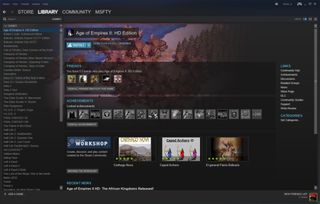
Games, apps, and services delivered as Win32, via Steam as an example, aren't going to go away as a result of UWP, at least not in the foreseeable future. Valve boss Gabe Newell voiced similar concerns about Windows 8.1's app store and its UWP predecessor back in the day too. The Steampocalypse never came to pass, nor will it.
Even when you disregard the fact Microsoft has effectively confirmed that Universal Windows Apps will be capable of being distributed via means beyond the Windows 10 Store, there's no reason why UWP and Win32 can't coexist — they offer differing experiences.
A traditional Win32 game potentially allows power users to get more bang for their buck. Full access to the game's files not only allows for fun gameplay mods but, occasionally, the modding community will work together to improve a game from the ground up. The apocalyptic S.T.A.L.K.E.R. Shadow of Chernobyl is a notorious example of a PC game that benefits immensely from mods as the game is virtually unplayable without them, due to bugs and other anomalies. Garry's Mod transitioned from quirky Half Life 2 sandbox to a massive indie hit, going on to sell over 6 million copies. Games packaged for UWP aren't easily tinkered with. Of course, this has both pros and cons.

UWAs are sandboxed, meaning they can't take over your PC to the same extent a Win32 program potentially can. Microsoft added User Account Control (those annoying security pop-ups which darken your screen) a few years back to rein in the power and potential harm a Win32 app can inflict on your PC. That openness has forced Microsoft to include baseline anti-virus defenses into Windows too, in the form of Defender.
"The [console and PC experiences] are uniquely different in ways that we want to embrace both."— Phil Spencer on MNR
Typically, people who game on consoles or smartphones don't have to navigate these problems, because not only do those contained app packages have to sail through the platform's internal testing, but they just don't wield the same power that a Win32 app does. When you uninstall a UWA, they don't leave any traces of themselves either, no cluttering folders, toolbars, annoying launchers, just clean, smartphone-like installations and updates, storing user data in the cloud. The console-like, smartphone-like experience is a key benefit of UWP.
For developers, it means that they can serve their AAA games to an audience that would rarely stray from Candy Crush and its various casual derivatives. The fact Microsoft selected Rise of the Tomb Raider — with its iconic brand — to test out UWP's AAA gaming chops should come as no surprise. It also means that their games are far less likely to be cracked, as UWP regularly checks the integrity of an app's files.
Running a UWA game from the Windows 10 Store might be a simpler and more familiar experience to an audience who has grown up with and become accustomed to the simplicity of smartphone app stores. I downloaded EA's PC MMO Star Wars The Old Republic recently, and was forced to trawl through forum posts and modify game files in Notepad to get the game to run.


It's rarely a huge problem, but as a Xbox gamer who is accustomed to, you know, games just working out of the box, Win32 gaming can be an incredibly annoying and fractured experience.
If UWP can deliver a more regulated environment for games, that'll potentially bring PC gaming to millions of people who prefer the ease of use that consoles and smartphone games afford them. If you want to play games with the full force of capabilities Win32 offers, tweaking, modding, and using third-party enhancements, then that experience is here to stay.
Indeed, none of this is to say UWP won't eventually evolve to adopt some of the benefits of Win32, but while we wait for UWP to mature, it'll coexist with Win32 gaming nicely, rather than in spite of it.
How UWP will benefit both Xbox and PC gamers
Microsoft's battle cry is "Mobile First, Cloud First" and it encompasses everything the company is doing right now. "Mobile" means mobility, and "cloud" refers to data and services travelling between you and Microsoft's massive server farms. UWP is designed from the ground up for mobility, and we're already beginning to see the benefits of that.
Microsoft updated the Xbox One with UWP capabilities last November with its New Xbox One Experience update (NXOE). We're yet to see Microsoft Office on the Xbox One, but the Xbox One Avatars app does appear to be sharing UWP code with its Windows 10 PC counterpart. The menu button on your Xbox One controller suddenly begins to make sense.
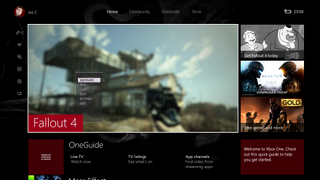
In some ways, I feel like NXOE was the true launch of the Xbox One, but as I mentioned earlier, getting all of Windows 10's pieces into place has taken years, and still has years ahead before it reaches maturity. We're going to get the full rundown on how Microsoft wants to shape gaming at Microsoft's Build event at the end of March, but they've already given us a lot to think about and discuss already.
On my Surface Pro 3, I can download DOSBox, hit http://GOG.com?pp=2e2a30bb154779e00c75f6f710777bc9f68e33b7 and play Wasteland 1 that came out in the 80s without issues. As long as your specs are up to scratch, and you're willing to go through the tweaks or additional programs to get older games running, you can potentially play any Windows game on your 2016 PC. With Project Centennial, Microsoft could bring some of that magic to Xbox One and streamline compatibility on PC in the process.
Project Centennial + UWP + Xbox One + mouse support = a ton of classic PC games fully compatible with your modern computer and Xbox One
I believe that part of the reason Microsoft wants to get mouse support on Xbox One isn't necessarily so you can use UWP Office more efficiently, it's so they can package older PC games for Xbox One and modern computers without having the developers fully retrofit the games for things like controller support.
Xbox 360 backwards compatibility was just the beginning. Tons of classic games like Bioware's incredible Knights of the Old Republic have already hit iOS, repackaged for Apple's easy-to-use console-like gaming store. The combination of Centennial and UWP could lead to thousands of classic games across your Xbox One and modern PC, without the annoyance of file tweaking or forum spelunking. And those apps could also plug into Xbox Live and all the benefits W10 has to offer. Of course, for UWP to achieve that sort of software renaissance, it has to be open to as many developers, publishers and technologies as possible, and from what we've heard, it appears Microsoft agrees.
Ultimate Windows Platform
The 'U' in UWP stands for 'Universal', but I think it should stand for 'Ultimate.' Windows 10 is the final destination for Microsoft; there isn't going to be a Windows 11, or 12. Updates to Windows 10 are going to be free moving forward, meaning the days of paid upgrades are totally gone.
Microsoft makes piles of cash licensing Windows to businesses, and through their cloud platforms like Office 365 and Azure. However, when it comes to Windows as a service, Microsoft would not only have to be insane to not try and develop a monetized consumer platform within W10 — they simply have no choice.
Microsoft would not only have to be insane to not try and develop a monetized consumer platform within W10 — they simply have no choice.
Through the popularity of iOS, Android and home consoles, millions of consumers have stood up and yelled loud and clear that they want a standardized software experience, and that's what UWP offers. The fact that the console versions eclipsed Minecraft on PC is a testament to that fact.
Simply put, UWP has a long way to go before it can achieve its full potential, and it's understandable, and in some ways encouraging, that consumers give Microsoft a (respectfully worded) hard time about it. Big corporations are incredibly good at disappointing their customers. Valve themselves managed to draw the ire of PC gamers recently, planning to charge for mods distributed through Steam. Skepticism has always been healthy, and will continue to be.
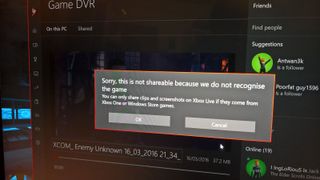
Still, I believe it's worth giving Microsoft the benefit of the doubt. The guys and girls who run Xbox are gamers themselves, they use Steam and even presented it on stage during the HoloLens reveal. When I interviewed Xbox platform head Mike Ybarra about NXOE last year, I framed some of my questions from the assumption that Microsoft wanted to take on Steam directly — Mike was quick to shut me down, saying they had no intention of doing that:
"I don't like to use the terminology like "take on Steam", I'm a big Steam user myself, I probably play more games on Windows than on console. I love the fact that Steam exists on Windows 10. Will we want to have a great robust store that has first-party and third-party games all the way from AAA down to mobile phones? Absolutely. We want to make the Windows Store an alternative for developers to distribute their games and for customers to acquire them."We don't necessarily see it as "taking on Steam", or Valve, because I think Valve is so much more than their distribution store. We love their games on our consoles, we love their games on Windows, and we think they do a lot to help Windows gaming in general."
I'd argue that Microsoft has possibly shoehorned AAA titles into UWP too early, but certain features are hard to test without setting it free into the wild. There are still questions about usability, particularly when it comes to hardware nuances like SLI, V-Sync, full-screen exclusive mode and so on. I'm one who is generally uninterested in mods and enjoys the ease of use and standardization that a console affords me, so games packaged for UWP are an attractive proposition, regardless of the storefront.
People like Sweeney are filling the blanks in their knowledge with fear and negativity, and it's understandable. We're used to getting screwed over by big companies. The negative PR might've hurt Microsoft, but it'll give them the opportunity to hear people's concerns and respond appropriately, whether vocally or in the policies they'll use to shape UWP.
Microsoft CEO Satya Nadella wants people to love Windows, and I'm sure he's well aware that part of that is openness. Free Office apps on iOS, SQL Server on Linux, Microsoft's Open Technologies initiative, the purchase of Xamarin those are all decisions that came from the top down.
Windows has always been an open ecosystem welcoming the contributions of hardware and software partners, and will always continue to be.Windows has always been an open ecosystem welcoming the contributions of hardware and software partners, and will always continue to be.— Phil Spencer (@XboxP3) March 4, 2016March 4, 2016
Phil Spencer and the Xbox team are well aware that Steam is the standard for AAA PC game distribution. Whether they try to emulate Steam a little more in the Windows 10 Store, or distribute their AAA UWP games like Quantum Break directly on Valve's store remains to be seen — and that's the entire point — we don't know what their plans are yet. I humbly request for people to stow their pitchforks for a few more weeks, wait for Build 2016, and see what Microsoft has in store.
When you disregard the past, and follow today's Microsoft, it's plain to see that UWP is not evil in intent. Not only is it an opportunity for standardization and universal distribution, but it's an opportunity for Microsoft to prove that they're dedicated to independent companies, and the openness that has typified PC gaming, and Windows development in general.

Jez Corden is the Executive Editor at Windows Central, focusing primarily on all things Xbox and gaming. Jez is known for breaking exclusive news and analysis as relates to the Microsoft ecosystem while being powered by tea. Follow on Twitter (X) and Threads, and listen to his XB2 Podcast, all about, you guessed it, Xbox!